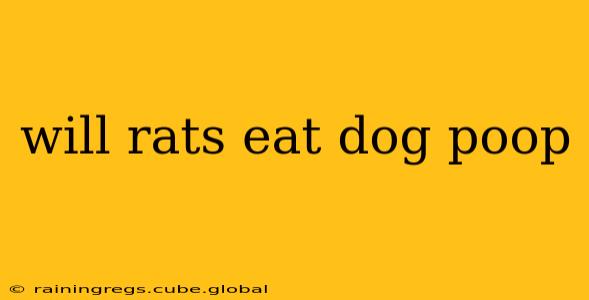Rats are opportunistic omnivores, meaning their diet is incredibly varied and driven by what's readily available. This brings us to the question many pet owners ponder: will rats eat dog poop? The short answer is: yes, they will. But the "why" is more complex and involves understanding rat behavior, nutritional needs, and the implications for your home and pet's health.
Why Would Rats Eat Dog Poop?
Rats are driven by survival and will consume almost anything to meet their caloric needs. Dog feces, while not ideal, offer a source of nutrients, particularly if the dog's diet is rich in protein and fats. This behavior isn't necessarily about preference; it's about resourcefulness. In environments lacking other food sources, dog poop becomes a viable option.
What Nutrients Do Rats Get From Dog Poop?
While not a balanced meal, dog feces can contain undigested proteins, fats, and carbohydrates from the dog's food. The exact nutritional content will vary depending on the dog's diet. However, it's important to note that dog poop also contains harmful bacteria and parasites that can affect rat health.
Are There Health Risks Associated with Rats Eating Dog Poop?
The consumption of dog feces poses several health risks to rats:
- Parasite Infestation: Dogs can harbor various internal and external parasites. These parasites can easily transfer to rats consuming their feces, leading to illness and potentially death.
- Bacterial Infections: Dog feces contain numerous bacteria, some of which are pathogenic (disease-causing) and can cause serious infections in rats.
- Toxic Substances: Depending on the dog's diet and medication, dog feces might contain toxic substances harmful to rats.
How to Prevent Rats From Eating Dog Poop?
Preventing rats from accessing your dog's waste is crucial for both your pet's and your home's hygiene. Here are some practical steps:
- Prompt and Proper Waste Disposal: Pick up your dog's feces immediately and dispose of them in sealed trash bags. Regularly empty your trash cans to avoid attracting rodents.
- Maintain a Clean Yard: Keep your yard free of debris, clutter, and other potential food sources that might attract rats. Regularly mow your lawn and trim bushes to reduce hiding places.
- Secure Trash Cans: Use trash cans with tight-fitting lids to prevent rats from accessing the contents.
- Rat Proofing: Identify and seal any potential entry points for rats into your home, such as cracks in the foundation or gaps around pipes.
- Professional Pest Control: If you have a persistent rat problem, contacting a professional pest control service is highly recommended.
What other things do rats eat?
Rats are opportunistic feeders and their diet is incredibly diverse. They'll consume a wide range of foods, including:
- Human Food Scraps: Leftovers, crumbs, and spilled food are major attractants.
- Pet Food: Dry and wet pet food is a highly appealing food source for rats.
- Seeds and Grains: Rats are attracted to areas where seeds and grains are stored.
- Fruits and Vegetables: They readily consume various fruits and vegetables.
- Insects: Rats will sometimes hunt and eat insects.
Is it common for rats to eat dog poop?
While not their preferred food source, it's not uncommon for rats to eat dog poop, especially when other food sources are scarce. This behavior highlights their adaptability and opportunistic feeding habits. The greater concern is the potential health consequences for the rats and the risk of disease transmission.
How can I tell if I have a rat problem?
Signs of a rat infestation include:
- Droppings: Dark, rat-sized droppings found in various locations.
- Gnaw Marks: Evidence of gnawing on wood, cables, or other materials.
- Tracks and Rub Marks: Footprints or greasy rub marks along walls or surfaces.
- Nests: Rats build nests using various materials in concealed areas.
- Unusual Noises: Scratching or scurrying sounds, particularly at night.
This comprehensive guide provides valuable information regarding rat behavior and waste management. Remember, proactive measures are key to preventing rat infestations and protecting both your pets and your home.
